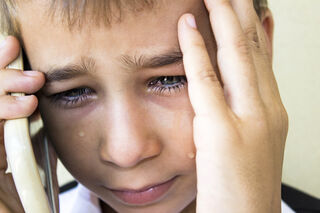Anxiety
Helping Your Homesick Tween
Dealing with that dreaded call from camp.
Posted June 19, 2022 Reviewed by Jessica Schrader
Key points
- Getting a homesick call from your tween at camp is challenging.
- How you react to the call can impact the outcome of the situation.
- Don't take the call at face value; gather the facts so that you can generate successful solutions.

School is finally out and the kids are off to camp. You are feeling relaxed and rested—you made it through another academic year. Then suddenly it comes: the dreaded phone call. Your tween is crying on the other end of the line, begging and pleading to come home. Your heart breaks for her. You are paralyzed. What should you do? You want to tell your tween to hold on, that you are leaving your house immediately. Or maybe, you want to tell him to stop crying and suck it up, that things will get better. Before you make rash decisions one way or another, take a deep breath, and read on.
Remain calm, cool, and collected. How you handle the call can make all the difference.
Regardless of how you feel when you hear his voice on the other end, keep your tone even and calm. Avoid sounding anxious, angry, or even too upbeat or cheery. Even though your stomach may be doing somersaults from the anxiety you’re feeling, never let him hear you sweat.
Listen carefully.
The most invalidating thing you could do right now is to cut her off. Listen well, and repeat what your child is telling you to ensure you understand.
Assess the situation.
If this is the first time your child is going to camp, you will likely have a different response than if this is the fourth or fifth time. If your child is an experienced camper, is this a common initial response to camp, or is camp usually their happy place? Of course, it will also depend on the content of the call. Does your child want to go home because he hates the food, or does she feel like she’s being bullied?
Hold back on immediately offering solutions. Ask your child to offer options.
Sometimes after your child has been given the opportunity to connect with you and regurgitate all her grievances, the immediate relief is enough of a solution. If your child immediately answers that he wants you to come to pick him up, start with simpler solutions. If, for example, your child is complaining about the food, tell him you will contact the kitchen to figure out some options. If your child is new to camp and says she wants to go home, ask her to stick it out a few more days. Meanwhile, you should call the camp administration and problem-solve. Camp personnel should be used to dealing with these types of dilemmas, and they usually can offer creative solutions.
Complete a fact-finding mission.
As mentioned above, it is important that you call camp administration after you receive such a call. Don’t be shocked if they had no idea how homesick your child is. Kids are often pretty good at keeping it together, especially in front of their peers. If your child tells you she is being bullied, ask administrators if you can also talk directly to camp personnel such as counselors. If you know the parents of other kids at the camp, especially in your child’s group, ask them to check in with their kids about their opinions of how things are going for your child. Be careful to make it clear you are just looking for their tween’s impression of your child’s experience. You want to avoid putting their child in the awkward position of trying to fix things for your tween.
Sending your tween to camp is a wonderful opportunity for most kids. It affords your tween a chance to adjust to a non-academic environment away from home. As research has reflected, it is good prep if they are planning to go away to college. How you handle a pleading call home can define your tween's camp experience. Handling these calls in a calm, caring, and careful way can be the difference between whether they stay or go.
References
Tuchman, L., & Williams, I. (2020). The Effect of Sleepaway Camp Attendance on College Homesickness. Journal of Student Research, 9(2)


